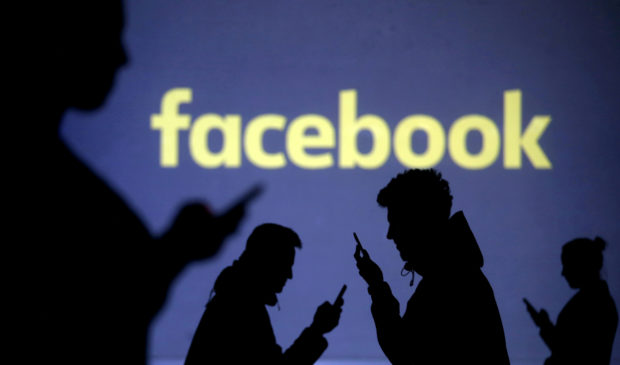Justice Department accuses Facebook of discriminating against US workers

Silhouettes of mobile users are seen next to a screen projection of Facebook logo in this picture illustration taken March 28, 2018. (Reuters)
The U.S. Justice Department accused Facebook on Thursday of discriminating against U.S. workers, saying in a new lawsuit the social media giant has given hiring preferences to temporary workers, including those who hold H-1B visas.
The Justice Department said that Facebook had “refused” to recruit, consider or hire qualified U.S. workers for more than 2,600 jobs that in many cases paid an average salary of $156,000 a year.
Instead, it opted to fill the positions using temporary visa holders, such as those with H-1B visas, the department added.
“Facebook intentionally created a hiring system in which it denied qualified U.S. workers a fair opportunity to learn about and apply for jobs,” the Justice Department said. The social media company instead sought to channel such jobs to temporary visa holders it wanted to sponsor for green cards or permanent residency, it added.
Company spokesman Daniel Roberts said: “Facebook has been cooperating with the DOJ in its review of this issue and while we dispute the allegations in the complaint, we cannot comment further on pending litigation.”
H-1B visas are often used by the technology sector to bring highly skilled foreign guest workers to the United States. But critics say the laws governing these visas are lax, and make it too easy to replace U.S. workers with cheaper, foreign labor.
The Facebook lawsuit is the latest example of the Trump administration clashing with Silicon Valley over attempts to restrict immigration for foreign workers. Trump and Republican lawmakers have also clashed with the company in other areas, such as accusing the platform of stifling conservative voices.
The Justice and Labor departments have both investigated big tech companies in the past over allegations similar to those against Facebook, but they have rarely brought charges due to loopholes in the law.
Tech companies and industry groups have pushed back against moves to limit immigration of foreign workers by saying there are not enough American students graduating with science and engineering degrees to meet the demand for filling jobs in areas such as artificial intelligence.
In June, Trump issued a presidential proclamation that temporarily blocked foreign workers entering on H-1B visas — an attempt the administration then said would open up 525,000 jobs for U.S. workers.
Among the top 30 H-1B employers are major U.S. firms including Amazon, Microsoft, Walmart, Alphabet’s Google, Apple, and Facebook, according to a report by the Economic Policy Institute (EPI) in May.
The EPI report said most companies using H1B visas take advantage of program rules in order to legally pay such workers below the local median wage for the jobs they fill.